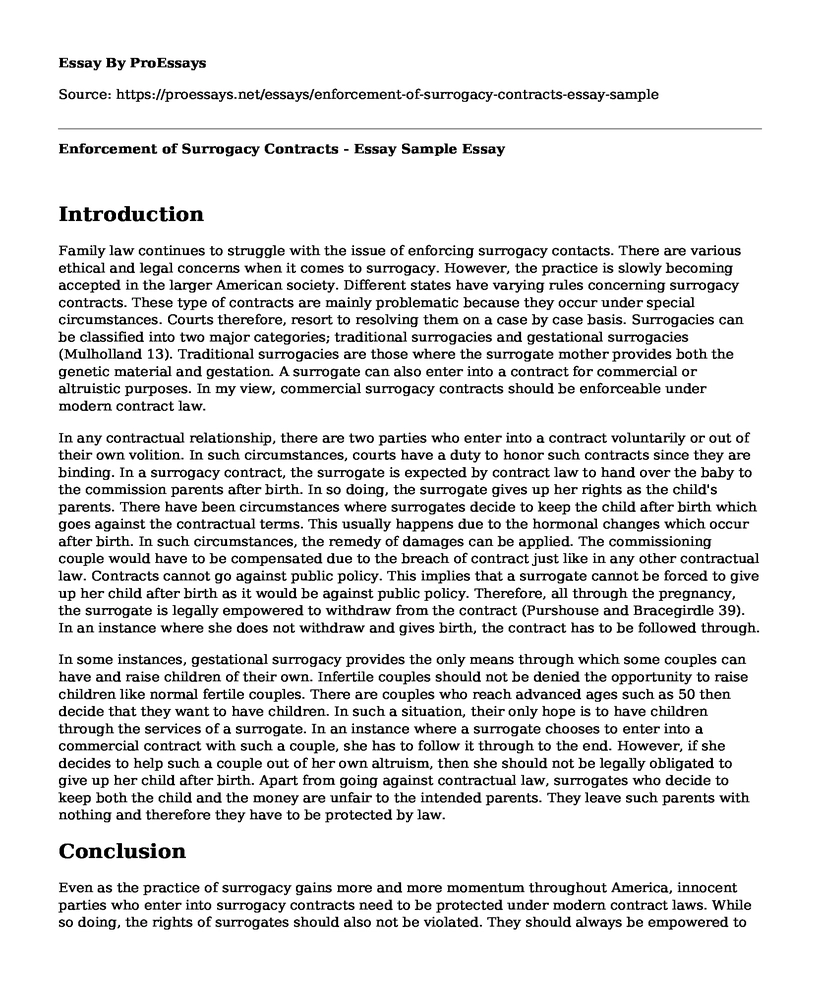Introduction
Family law continues to struggle with the issue of enforcing surrogacy contacts. There are various ethical and legal concerns when it comes to surrogacy. However, the practice is slowly becoming accepted in the larger American society. Different states have varying rules concerning surrogacy contracts. These type of contracts are mainly problematic because they occur under special circumstances. Courts therefore, resort to resolving them on a case by case basis. Surrogacies can be classified into two major categories; traditional surrogacies and gestational surrogacies (Mulholland 13). Traditional surrogacies are those where the surrogate mother provides both the genetic material and gestation. A surrogate can also enter into a contract for commercial or altruistic purposes. In my view, commercial surrogacy contracts should be enforceable under modern contract law.
In any contractual relationship, there are two parties who enter into a contract voluntarily or out of their own volition. In such circumstances, courts have a duty to honor such contracts since they are binding. In a surrogacy contract, the surrogate is expected by contract law to hand over the baby to the commission parents after birth. In so doing, the surrogate gives up her rights as the child's parents. There have been circumstances where surrogates decide to keep the child after birth which goes against the contractual terms. This usually happens due to the hormonal changes which occur after birth. In such circumstances, the remedy of damages can be applied. The commissioning couple would have to be compensated due to the breach of contract just like in any other contractual law. Contracts cannot go against public policy. This implies that a surrogate cannot be forced to give up her child after birth as it would be against public policy. Therefore, all through the pregnancy, the surrogate is legally empowered to withdraw from the contract (Purshouse and Bracegirdle 39). In an instance where she does not withdraw and gives birth, the contract has to be followed through.
In some instances, gestational surrogacy provides the only means through which some couples can have and raise children of their own. Infertile couples should not be denied the opportunity to raise children like normal fertile couples. There are couples who reach advanced ages such as 50 then decide that they want to have children. In such a situation, their only hope is to have children through the services of a surrogate. In an instance where a surrogate chooses to enter into a commercial contract with such a couple, she has to follow it through to the end. However, if she decides to help such a couple out of her own altruism, then she should not be legally obligated to give up her child after birth. Apart from going against contractual law, surrogates who decide to keep both the child and the money are unfair to the intended parents. They leave such parents with nothing and therefore they have to be protected by law.
Conclusion
Even as the practice of surrogacy gains more and more momentum throughout America, innocent parties who enter into surrogacy contracts need to be protected under modern contract laws. While so doing, the rights of surrogates should also not be violated. They should always be empowered to get out of contracts early enough in case the surrounding circumstances change. The terms of surrogacy agreements need to be explicitly stated and understood by all parties to avoid unnecessary conflict along the agreement period.
Works Cited
Mulholland, M. "Surrogate Motherhood." Journal of Medical Ethics, vol. 16, no. 4, 1990, pp. 221-221.
Purshouse, Craig, and Kate Bracegirdle. "The Problem of Unenforceable Surrogacy Contracts: Can Unjust Enrichment Provide a Solution?" Medical Law Review, 2018, doi.org/10.1093/medlaw/fwy001. Accessed 15 Sept. 2018.
Cite this page
Enforcement of Surrogacy Contracts - Essay Sample. (2022, Jul 15). Retrieved from https://proessays.net/essays/enforcement-of-surrogacy-contracts-essay-sample
If you are the original author of this essay and no longer wish to have it published on the ProEssays website, please click below to request its removal:
- Article Analysis Sample - HazMat Emergencies: Decontamination and Victim Chain of Survival
- Legal and Ethical Application of Differentiated Essential Competencies (DECs)
- Gastrointestinal Case Study Paper Example
- How Indigenous People Honor the Lands Essay Example
- Nurses, Patients and the Effects of Extended Hours - Essay Sample
- Essay Example on COVID-19 Impacts: Hospitality Industry Hit Hardest by Pandemic
- Cultural Diversity: Essential for Nurses to Understand Human Behavior - Essay Sample







